Key takeaways:
- Understanding solar contracts is crucial, especially regarding contract duration, cancellation fees, and warranty coverage to avoid future expenses.
- Solar energy significantly enhances luxury yacht performance and reduces operational costs, aligning with modern sustainable values.
- Negotiating contracts can lead to better terms, including total cost of ownership, warranty coverage, and payment flexibility, ultimately ensuring a favorable agreement.
- Engaging with experienced individuals or attending workshops can clarify complexities in contracts, helping to identify hidden fees and enhance decision-making.
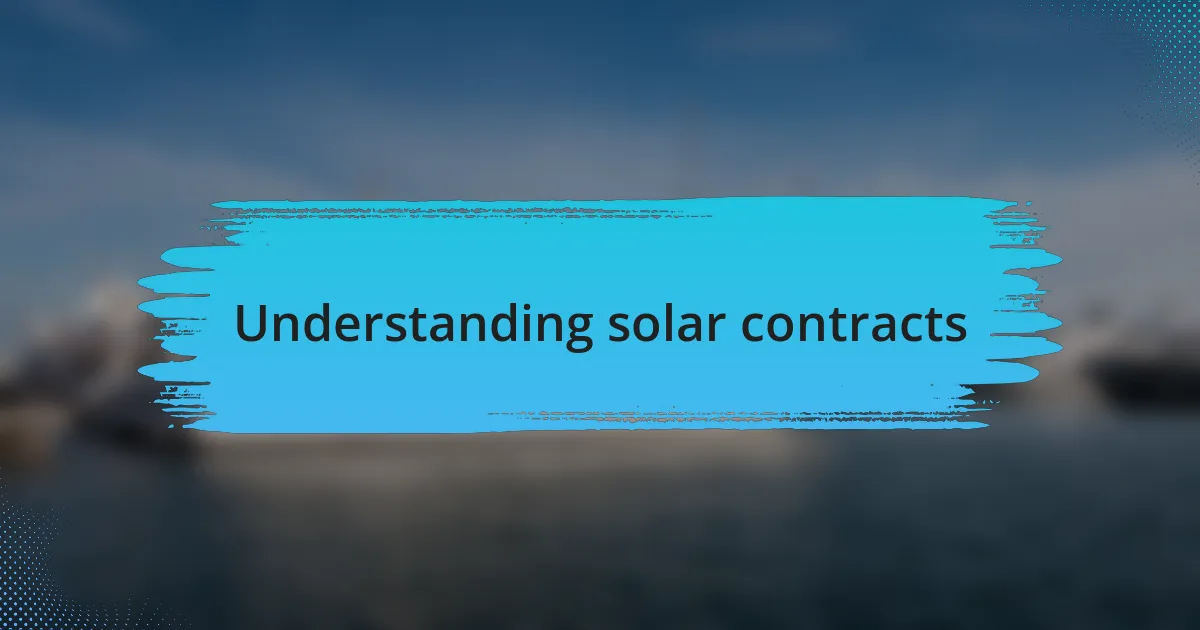
Understanding solar contracts
Navigating solar contracts can feel a bit overwhelming, especially if you’re like me and want to make informed decisions. I remember when I first encountered this intricate landscape; I had so many questions swirling in my mind, such as how do I truly understand the terms without legal jargon complicating things? It’s essential to break down those terms into simpler language so you can clearly grasp the implications of decisions you’re making.
One thing that struck me during my exploration was the importance of understanding the contract length and your rights regarding termination. I once signed a contract that seemed ideal until I realized the cancellation fees were astronomical if I wanted out. Wouldn’t it be better to ensure that your contract provides you with flexibility, rather than locking you into something you might regret later?
Understanding the various components, such as installation costs, maintenance responsibilities, and warranties, is crucial. I learned the hard way that overlooking a warranty can lead to massive out-of-pocket expenses down the line. Reflecting on that experience, I always ask new buyers if they’ve thoroughly reviewed what is covered. Have you done the same? Ensuring that you’re well-versed in these details can give you peace of mind and protect your investment in the long term.
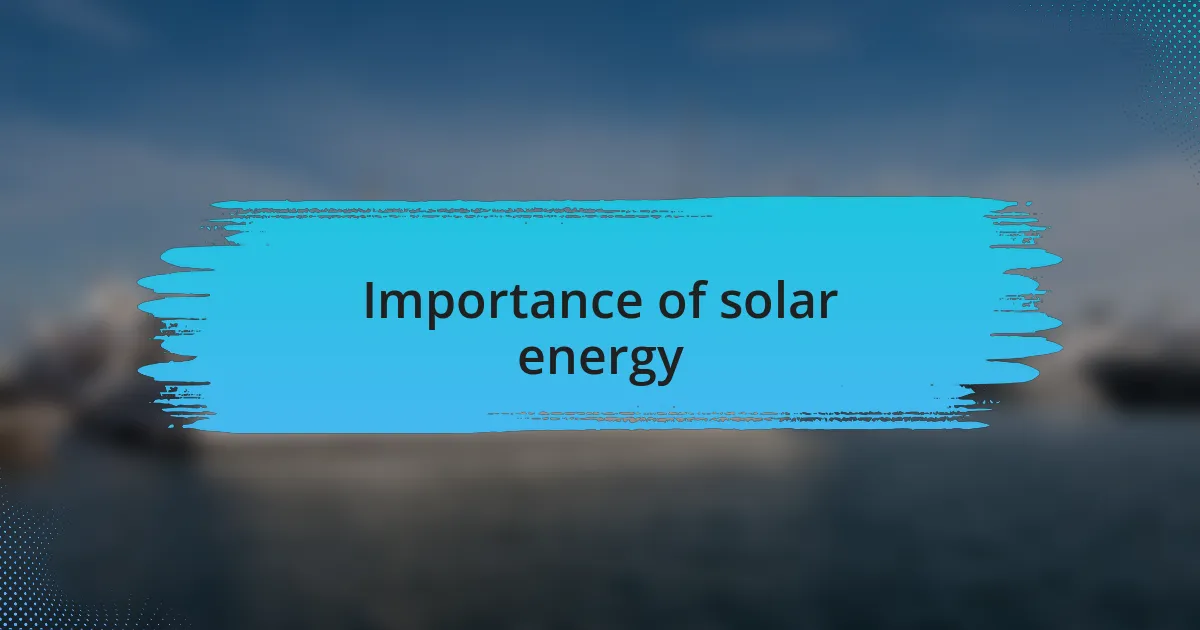
Importance of solar energy
Solar energy plays a pivotal role in today’s luxury yacht market, providing an eco-friendly alternative that aligns with modern values. I recall a yacht trip where the owner made a concerted effort to utilize solar panels. Watching the sun power up the entire vessel was not only impressive but also a strong statement about sustainability in luxury. Isn’t it inspiring to see an industry often associated with excess embracing renewable energy?
The ability to harness solar energy on yachts enhances both performance and comfort. I remember feeling a sense of freedom when, during a long voyage, we relied solely on solar power for our amenities without worrying about fuel costs. Have you considered how much more enjoyable a trip could be when you know you’re not just spending, but saving, all while being kind to the planet?
Moreover, incorporating solar energy systems can significantly reduce operational costs. I once spoke with a yacht owner who shared that his solar investment led to a drastic reduction in fuel expenses over time, making his travels not only luxurious but also efficient. This made me think about how every decision can add up; when considering a yacht, can you afford not to explore solar options?
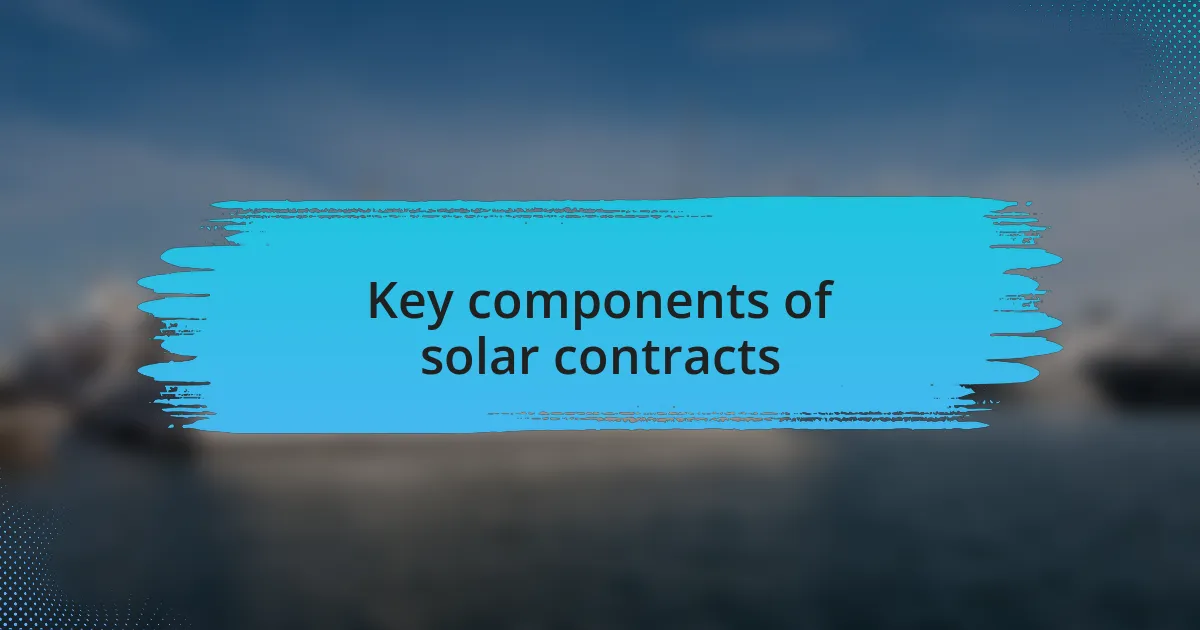
Key components of solar contracts
When it comes to solar contracts, one of the key components is the contract duration. This stipulates how long the agreement will remain in effect, often ranging from 10 to 25 years. I recall negotiating a contract for a high-end yacht where we opted for a longer duration, knowing it would secure our investment against future price fluctuations in energy costs. Isn’t it reassuring to lock in those rates while enjoying the freedom of solar power?
Another critical aspect is the payment structure, which can vary widely, including upfront costs, monthly payments, or even performance-based incentives. In my experience, choosing a financing option based on potential savings has been beneficial. For instance, I once assisted a yacht owner who selected a performance-based model that matched his energy usage, allowing him to reap the benefits of solar without a hefty initial investment. Have you thought about what payment structure aligns best with your financial goals?
Finally, warranties should never be overlooked. They cover the equipment and installation, ensuring peace of mind for yacht owners. I still remember helping a friend review warranties; it was eye-opening to see how different manufacturers offered varying levels of coverage. Wouldn’t you want to be confident that your solar system will perform optimally for years to come without unexpected expenses?
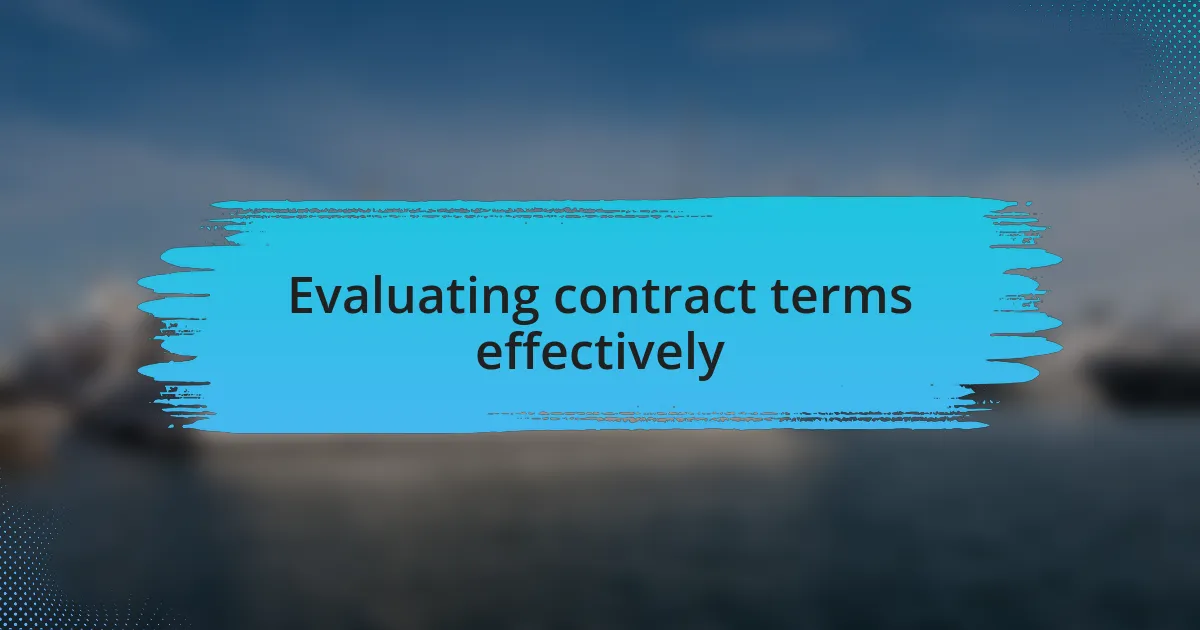
Evaluating contract terms effectively
Evaluating contract terms effectively requires a keen eye for details and a clear understanding of your priorities. I once faced a situation where a seemingly attractive contract had hidden fees that would have impacted my budget significantly over time. It taught me the importance of digging deeper into each term and asking questions—what other costs might be lurking in the fine print?
Another essential factor is the flexibility of the terms. In my experience, I appreciated a contract that allowed for potential adjustments as my energy needs evolved. This adaptability is crucial for yacht owners, as we often upgrade or modify our vessels. Have you considered how your energy requirements might change in a few years?
Finally, never underestimate the power of negotiation. I vividly recall a time when I successfully negotiated better terms by simply expressing my concerns about the initial offer. Engaging in open dialogue with the provider helped me secure a more favorable agreement that reflected my needs. Have you thought about how your confidence in negotiation can affect your contract outcomes?
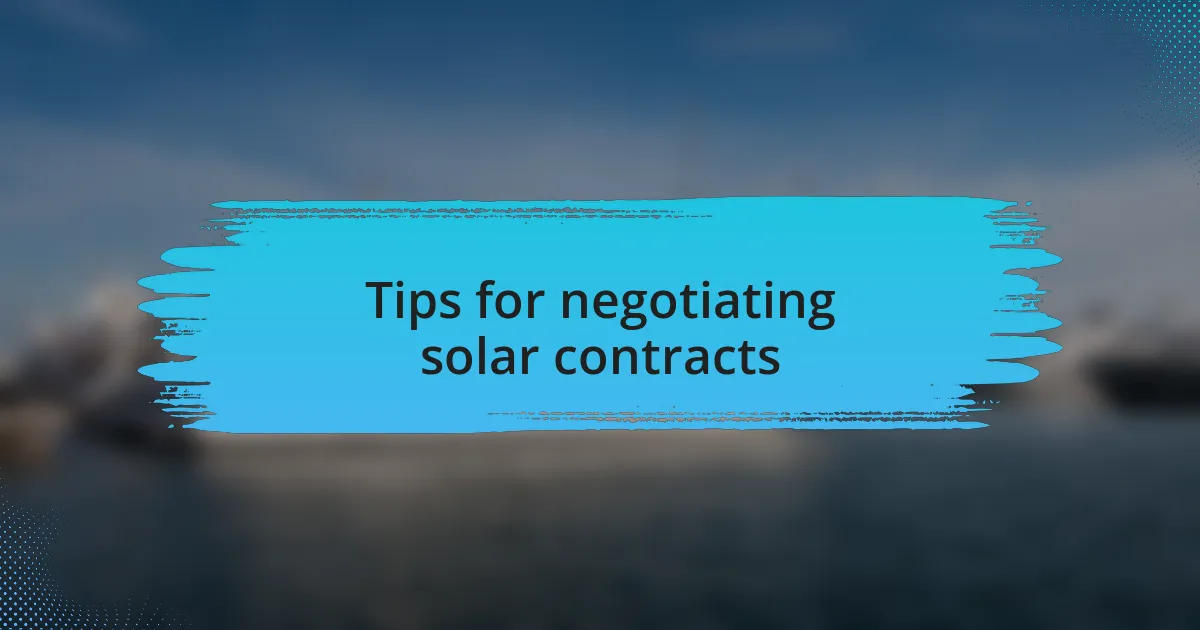
Tips for negotiating solar contracts
When it comes to negotiating solar contracts, focusing on the total cost of ownership can be a game changer. I once negotiated a contract where I made sure to include not just the upfront installation fees but also maintenance costs over the years. This comprehensive view allowed me to understand the real financial impact, shedding light on long-term savings. Have you ever considered how neglecting certain costs might cloud the overall value of a deal?
Another critical aspect is understanding the warranty coverage. I remember a discussion with a provider about the lifespan of the solar panels and what would happen if something went wrong. By pressing for clarity on the warranty terms, I was able to secure an extended coverage, which brought me peace of mind and financial protection. Have you explored what kind of coverage is reasonable for your situation?
Lastly, don’t hesitate to shop around and gather multiple quotes. In my experience, one quote can sometimes limit your perspective on the market. I recall a time when a second offer not only provided a better price but also more attractive terms. This exercise reinforced my belief that a little comparison shopping can lead to substantial savings and improved conditions. How prepared are you to explore all your options before making a commitment?
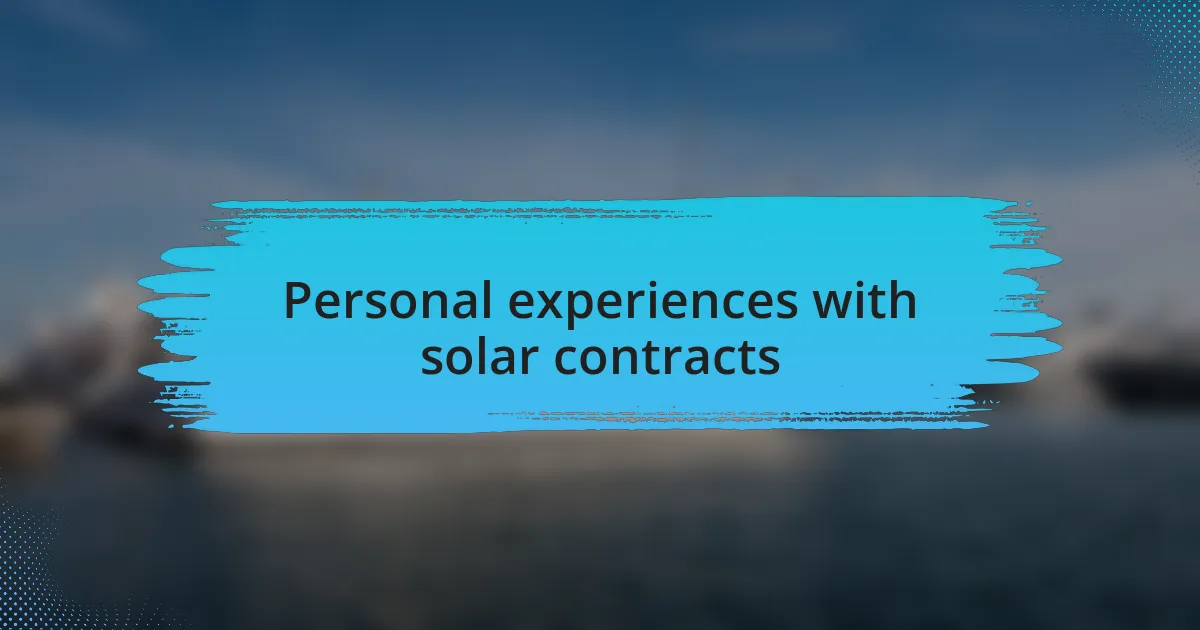
Personal experiences with solar contracts
Navigating the details of solar contracts can often feel overwhelming. I recall the first contract I examined, where the terms seemed like a jumble of technical jargon. What I found helpful was bringing in a friend who had experience with solar installations. That collaboration not only eased my anxiety but opened my eyes to nuances I might have missed. Have you ever found clarity by discussing complex topics with someone experienced?
One memorable experience was when I attended a solar panel installation workshop. The presenter highlighted common pitfalls in contracts, including hidden fees. Afterward, I realized how crucial it is to read the fine print. I made a mental note to always question any vague language that could lead to unexpected charges. How often do you pause to scrutinize details that might seem trivial at first glance?
I also faced a situation where a contract lacked flexibility on payment options. After explaining my concerns, the company was willing to offer a revised plan that fit my financial situation better. This taught me that being vocal about my needs could lead to beneficial adjustments. Have you ever been surprised by how discussing your preferences can reshape a deal in your favor?